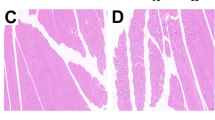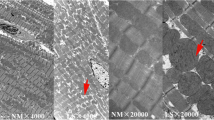Abstract
Dietary selenium (Se) deficiency is known to cause myodynia syndrome and Se influences immune responses by changing the expression of inflammatory cytokines and heat shock proteins (Hsps), but the details are not completely elucidated. In the present study, 72 1-day-old mice were divided into two groups; the first group was fed a Se-sufficient diet, while the second group was fed a Se-deficient diet. Skeletal muscles and blood samples were taken from all mice after 42 days of treatment. The activities of glutathione peroxidase (GPX) and glutathione (GSH), mRNA and protein expression levels of inflammatory cytokines (including TNF-α, inducible NO synthase, cyclooxygenase-2, and prostaglandin E synthases), protein expression levels of NF-κB, and the mRNA expression levels of Hsps in the skeletal muscles of mice were examined. The results showed that GPX and GSH activities were decreased, while the mRNA and protein expression levels of inflammatory cytokines and the mRNA levels of Hsps were increased by Se deficiency in mouse skeletal muscles. In the present study, the protective role of Se in oxidative stress, inflammatory cytokines, and Hsps in the skeletal muscles of mice was summarized.





Similar content being viewed by others
References
Kieliszek M, Błażejak S, Gientka I, Bzducha-Wróbel A (2015) Accumulation and metabolism of selenium by yeast cells. Appl Microbiol Biotechnol 99(13):5373–5382
Karaye KM, Yahaya IA, Lindmark K, Henein MY (2015) Serum selenium and ceruloplasmin in nigerians with peripartum cardiomyopathy. Int J Mol Sci 16(4):7644–7654
Zhao ZJ, Li Q, Yang PZ, Wang H, Kong LC, Wang LH, Sun LY (2013) Selenium: a protective factor for Kaschin-Beck disease in Qing-Tibet Plateau. Biol Trace Elem Res 153(1–3):1–4
Pietschmann N, Rijntjes E, Hoeg A, Stoedter M, Schweizer U, Seemann P, Schomburg L (2014) Selenoprote in P is the essential selenium transporter for bones. Metallomics 6(5):1043–1049
Yao HD, Wu Q, Zhang ZW, Li S, Wang XL, Lei XG, Xu SW (2013) Selenoprotein W serves as an antioxidant in chicken myoblasts. Biochim Biophys Acta 1830(4):3112–3120
Lohachanakul J, Phuklia W, Thannagith M, Thongsakulprasert T, Smith DR, Ubol S (2015) Differences in response of primary human myoblasts to infection with recent epidemic strains of Chikungunya virus isolated from patients with and without myalgia. J Med Virol 87(5):733–739
Nazıroğlu M, Yıldız K, Tamtürk B (2012) Selenium and psoriasis. Biol Trace Elem Res 150(1–3):3–9
Hoffmann PR (2007) Mechanisms by which selenium influences immune responses. Arch Immunol Ther Exp 55(5):289–297
Wu Q, Yao HD, Tan SR, Zhang ZW, Zhu YH, Xu SW (2014) Possible correlation of selenoprotein W with inflammation factors in chicken skeletal muscles. Biol Trace Elem Res 161(2):167–172
Du Q, Yao HD, Yao LL, Zhang ZW, Lei XG, Xu SW (2016) Selenium deficiency influences the expression of selenoproteins and inflammatory cytokines in chicken aorta vessels. Biol Trace Elem Res 173(2):501–513
Cao YZ, Reddy CC, Sordillo LM (2000) Altered eicosanoid biosynthesis in selenium-deficient endothelial cells. Free Radic Biol Med 28(3):381–389
Tamada H, Adachi N, Kawate N, Inaba T, Hatoya ST (2016) Positive correlation between patency and mRNA levels for cyclooxygenase-2 andprostaglandin E synthase in the uterine cervix of bitches with pyometra. J Vet Med Sci 78(3):525–528
Yao HD, Wu Q, Zhang ZW, Lei XG (2013) Gene expression of endoplasmic reticulum resident selenoproteins correlates with apoptosis in various muscles of se-deficient chicks. J Nutr 143(5):613–619
Tang R, Liu H, Wang T, Huang KX (2005) Mechanisms of selenium inhibition of cell apoptosis induced by oxysterols in rat vascular smooth muscle cells. Arch Biochem Biophys 441:16–24
Khoso PA, Yang Z, Liu C, Li S (2015) Selenoproteins and heat shock proteins play important roles in immunosuppression in the bursa of Fabricius of chickens with selenium deficiency. Cell Stress Chaperones 20:967–978
Zhao FQ, Zhang ZW, Qu JP, Yao HD, Li M, Li S, Xu SW (2014) Cold stress induces antioxidants and Hsps in chicken immune organs. Cell Stress Chaperones 19(5):635–648
Tsan MF, Gao B (2009) Heat shock proteins and immune system. J Leukoc Biol 85:905–910
Van Eden W, Wick G, Albani S, Cohen I (2007) Stress, heat shock proteins, and autoimmunity: how immune responses to heat shock proteins are to be used for the control of chronic inflammatory diseases. Ann N Y Acad Sci 1113:217–237
Liu Z, Qu Y, Wang J, Wu R (2016) Selenium deficiency attenuates chicken duodenal mucosal immunity via activation of the NF-κb signaling pathway. Biol Trace Elem Res 172(2):465–473
Peirson SN, Butler JN, Foster RG (2003) Experimental validation of novel and conventional approaches to quantitative real-time PCR data analysis. Nucleic Acids Res 31(14):e73
Adamis PD, Gomes DS, Pinto ML, Eleutherio EC (2004) The role of glutathione transferases in cadmium stress. Toxicol Lett 154:81–88
Yao H, Zhao W, Zhao X, Fan R, Khoso PA, Zhang Z, Liu W, Xu S (2014) Selenium deficiency mainly influences the gene expressions of antioxidative selenoproteins in mice muscles. Biol Trace Elem Res 161:318–327
Khoso PA, Liu C, Liu C, Khoso MH, Li S (2016) Selenium deficiency activates heat shock protein expression in mice Spleen and Thymus. Biol Trace Elem Res 173(2):492–500
Yang Z, Liu C, Zheng W, Teng X, Li S (2016) The functions of antioxidants and heat shock proteins are altered in the immune organs of selenium-deficient broiler chickens. Biol Trace Elem Res 169(2):341–351
Ghazi Harsini S, Habibiyan M, Moeini MM, Abdolmohammadi AR (2012) Effects of dietary selenium, vitamin E, and their combination on growth, serum metabolites, and antioxidant defense system in skeletal muscle of broilers under heat stress. Biol Trace Elem Res 148(3):322–330
Huang JQ, Ren FZ, Jiang YY, Xiao C, Lei XG (2015) Selenoproteins protect against avian nutritional muscular dystrophy by metabolizing peroxides and regulating redox/apoptotic signaling. Free Radic Biol Med 83:129–138
Wilczek G, Babczyńska A, Augustyniak M, Migula P (2004) Relations between metals (Zn, Pb, Cd and Cu) and glutathione-dependent detoxifying enzymes in spiders from a heavy metal pollution gradient. Environ Poll 32(3):453–461
Kim Y, Kim DC, Cho ES, Ko SO, Kwon WY, Suh GJ, Shin HK (2014) Antioxidant and anti-inflammatory effects of selenium in oral buccal mucosa and small intestinal mucosa during intestinal ischemia-reperfusion injury. J Inflamm(Lond) 11(1):36
Gao X, Zhang Z, Li Y, Hu X, Shen P, Fu Y, Cao Y, Zhang N (2016) Selenium deficiency deteriorate the inflammation of S. aureus infection via regulating NF-κB and PPAR-γ in mammary gland of mice. Biol Trace Elem Res 172(1):140–147
Gao X, Zhang Z, Li Y, Shen P, Hu X, Cao Y, Zhang N (2016) Selenium deficiency facilitates inflammation following S. aureus infection by regulating TLR2-related pathways in the mouse mammary gland. Biol Trace Elem Res 172(2):449–457
Maehira F, Miyagi I, Eguchi Y (2003) Selenium regulates transcription factor NF-kappaB activation during the acute phase reaction. Clin Chim Acta 334:163–171
Perkins ND (2007) Integrating cell-signalling pathways with NF-κB and IKK function. Nat Rev Mol Cell Biol 8:49–62
Sheng PF, Jiang Y, Zhang ZW, Zhang JL, Li S, Zhang ZQ, Xu SW (2014) The effect of Se-deficient diet on gene expression of inflammatory cytokines in chicken brain. Biometals 27(1):33–43
Gómez RM, Pacienza N, Schattner M, Habarta A, Levander OA, Sterin-Borda L (2007) Decreased beta-adrenoceptor chronotropic response: negative crosstalk between iNOS activity and cAMP accumulation. Biol Trace Elem Res 117(1–3):127–138
Molina MN, Ferder L, Manucha W (2016) Emerging role of nitric oxide and heat shock proteins in insulin resistance. Curr Hypertens Rep 18(1):1
Chen X, Yao H, Yao L, Zhao J, Luan Y, Zhang Z, Xu S (2014) Selenium deficiency influences the gene expressions of heat shock proteins and nitric oxide levels in neutrophils of broilers. Biol Trace Elem Res 161(3):334–340
Asea A, Kraeft SK, Kurt-Jones EA, Stevenson MA, Chen LB, Finberg RW, Koo GC, Calderwood SK (2000) HSP70 stimulates cytokine production through a CD14-dependant pathway, demonstrating its dual role as a chaperone and cytokine. Nat Med 6:435–442
Zhang A, Zhou XF, Wang XY (2011) Characterization of two heat shock proteins (Hsp 70 / Hsc 70) from grass carp (Ctenopharyngodon idella): evidence for their differential gene expression, protein synthesis and secretion in LPS-challenged peripheral blood lymphocytes. Comp Biochem Physiol B Biochem Mol Biol 159:109–114
Kaushal N, Bansal MP (2009) Selenium variation induced oxidative stress regulates p53 dependent germ cell apoptosis: plausible involvement of HSP70-2. Eur J Nutr 48(4):221–227
Acknowledgements
This work was supported by grants from the Foundation of National Natural Science Project, P.R. China (31272624), the Startup Foundation for the Doctors in Heilongjiang Bayi Agricultural University (Grant No. XDB-2017-18), and the School Cultivation Project Foundation in Heilongjiang Bayi Agricultural University (XZR2016-12). The authors wish to thank the study participants and Jilin University for their contributions to this study. We are grateful to Dr. Hua Zhang (College of Life Science and Technology, Heilongjiang BaYi Agricultural University) for a critical reading of the manuscript. All of the authors have read the manuscript and have agreed to submit it, in its current form, for consideration for publication.
Author information
Authors and Affiliations
Corresponding author
Ethics declarations
Conflict of Interest
The authors declare that they have no competing interests.
Additional information
The contribution of Zhe Liu and Xiaoying Yao co-together is equally important in this article.
Rights and permissions
About this article
Cite this article
Liu, Z., Yao, X., Du, J. et al. Selenium Deficiency Augments the Levels of Inflammatory Factors and Heat Shock Proteins via the Redox Regulatory Pathway in the Skeletal Muscles of Mice. Biol Trace Elem Res 182, 309–316 (2018). https://doi.org/10.1007/s12011-017-1100-5
Received:
Accepted:
Published:
Issue Date:
DOI: https://doi.org/10.1007/s12011-017-1100-5




